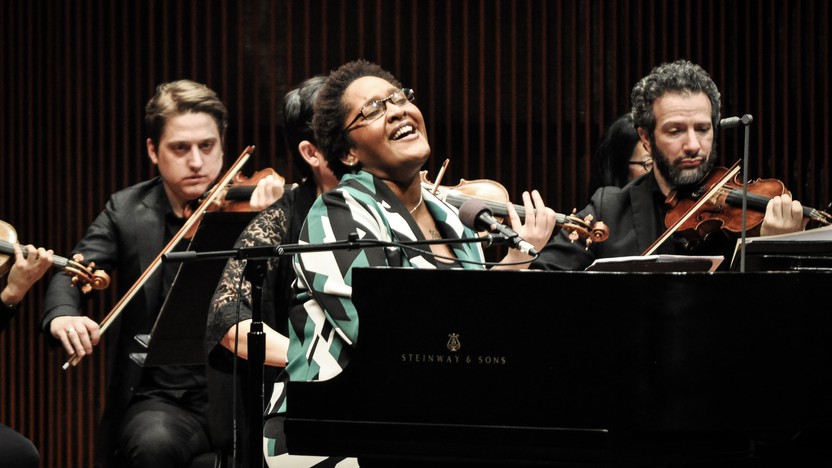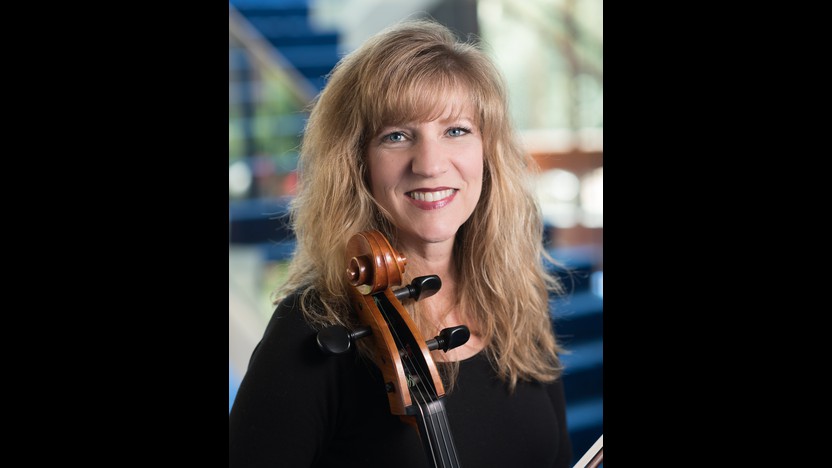Details
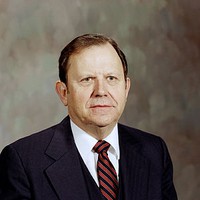
William Lucas
Fanfare for a Distant Friend
A Detroit native and graduate of the University of Michigan, William Lucas has been a member of the Detroit Symphony Orchestra trumpet section since 1988, and he also teaches at his alma mater and publishes his own compositions, arrangements and books on trumpet pedagogy and performance psychology. Lucas composed this fanfare for trumpeter Lynn Erickson, an orchestra member since 1991, and provided the following program note.
I composed this for my friend, trumpeter Lynn Erickson. The work opens with the chatter of friends in our society represented by a choir of electronic trumpets. All are soon warned of an impending disaster by the solo trumpet. The solo trumpet continues to implore and warn in tritone intervals conveying the anger, dismay, rage and sorrow over a pandemic that should not have happened, and that should have been better managed from the outset.
In the second section, the electronic trumpets represent our society now aware and alert to the situation. The solo trumpet continues to opine the tragedy of not being able to spend our time with friends — because they must be distant socially, because we cannot travel, or because they have suddenly ceased to exist due to the pandemic.
In the third section the muted trumpets represent the virus itself, as it creepily overtakes the population.
In the fourth and final section the chatter of our friends returns as the solo trumpet yet warns, “It is not over yet, heed the tritones of warning!” Our society, however, fails to listen as the virus once gain surges and overwhelms until the end, when our lone solo trumpet hangs on to a solitary C-natural, a sign that we will somehow survive the virus, alone if we must.
—William Lucas
Aaron Grad ©2022
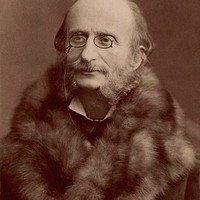
Jacques Offenbach
Les Larmes de Jacqueline (Jacqueline's Tears)
(Duration: 7 min)
Richard Wagner and Johannes Brahms may have been the most revered and influential composers of their time within elite circles, but if you had asked any average Joe in Europe who wrote the most popular music for the stage and concert hall, the two names on their tongue would have been Johann Strauss II and Jacques Offenbach. Born into a German family originating from the city that shares their surname, young Jacob Offenbach started going by Jacques when he resettled in Paris as a teenager. He left the Paris Conservatory after a year to play cello in the opera house that produced comedies, and in the decades to come he would specialize in those whimsical operettas that drew adoring crowds the way musicals do today.
Offenbach also kept up a recital career on the cello, and he bolstered his repertoire with the exquisitely tuneful Les larmes de Jacqueline (Jacqueline’s Tears) in 1853 as the second in a set of three “Woodland Harmonies.” Long a favorite of cellists, it reached new heights of popularity when the superstar cellist Jacqueline du Pré made it a signature piece.
Aaron Grad ©2023
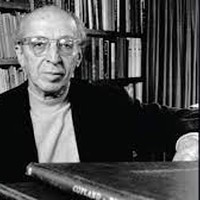 Listen to Audio
Listen to Audio
Aaron Copland
Suite from Appalachian Spring (24 min)
In the wake of two well-received ballets set in the American West — Billy the Kid (1938) and Rodeo (1942) — Aaron Copland began Appalachian Spring in 1943. He created the ballet for the dancer and choreographer Martha Graham, and he worked under the title Ballet for Martha until not long before the premiere, when Graham suggested Appalachian Spring, borrowing a phrase from Hart Crane’s poem “The Bridge.”
Created for the 500-seat auditorium at the Library of Congress in Washington, DC, this ballet needed a suitably compact pit orchestra, so Copland used just thirteen instruments in the original version. The next year he arranged most of the ballet into a concert suite for orchestra, and his publisher later added the option heard here, which preserves the original chamber ensemble scoring while adopting the structure of the concert suite.
The wonder of Appalachian Spring is how it achieves so much using such simple and familiar musical ingredients. The first section assembles its hazy wash of consonant sonorities by enunciating plain triads and the resonant intervals of fourths and fifths. The following section energizes similarly basic materials — octave leaps, triadic intervals and descending major scales — into spry dance music. There is a tender scene for the young couple, a lively romp depicting the revivalist and his dancing minions, and then a brisk solo dance for the bride, which dissipates into a return of the gentle, triadic wash of the beginning.
The famous section that follows, starting with a theme in the clarinet, presents the tune of Simple Gifts, a Shaker dance song written in 1848 by Joseph Brackett. The humble melody fits seamlessly into the homespun, diatonic language of Copland’s score, and its increasingly grand variations rise to a transcendental climax.
Aaron Grad ©2024
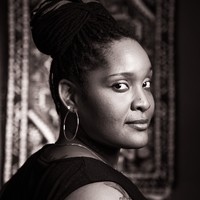
PaviElle French
Sands of Time (World Premiere, SPCO Commission)
PaviElle French, vocals and keyboard
Ted Godbout, keyboard
Ahanti Young, percussion
Kevin Washington, drum set
Commissioned for the SPCO by community supporters Bill and Susan Sands in collaboration with the American Composers Forum.
Born into a musical family in the historically Black neighborhood of Rondo in Saint Paul, PaviElle French has brought her lifelong influences from ‘70s soul and R&B into her wide-ranging and powerful work as a singer, songwriter, poet and theater artist. After she approached The Saint Paul Chamber Orchestra for a possible collaboration, she embarked on her first foray into concert music in 2018 with A Requiem for Zula, an orchestral song cycle that honored her late mother.
When SPCO supporters Bill and Susan Sands decided to commission a new work for the orchestra in honor of their fiftieth anniversary, they entrusted French with the assignment and encouraged her to respond to the commission in any way that was meaningful for her. French worked on the resulting score, The Sands of Time, in a world before the Covid pandemic, and before the murder of George Floyd, events that have only deepened her resolve to use her music in service of human connection and justice. As in her first piece for orchestra, French collaborated with the arranger Michi Wiancko, but after steeping herself in the principles of orchestration and the ranges of concert instruments, French took on the responsibility of distributing her music into the orchestral parts herself, using her keyboard to record layer upon layer in Apple’s GarageBand software.
Through meetings where she got to know Bill and Susan Sands, French was inspired to have her first movement deal most directly with romantic love. From the beginning of this song that shares its punning title with the cycle as a whole, “Sands of Time,” French speaks to us, the audience, as a knowing guide: “I’ve been thinking, y’all,” she sings, “about what love has taught me this far.”
The second song, “Give Me Your Love,” pivots to an interrogation of what disrupts love — a sentiment inspired specifically by the former president. “Your finite words of hurt and hatred won’t pollute my mind or change my hope for unification,” she sings. As an orchestral interlude takes flight, she invites us along, shouting, “Hold on y’all! Change is coming!”
In an interview, French spoke about how, in the years since the deaths of her parents, she has been on a journey “to love myself and to like myself, and to understand why I am the way I am, and be investigative and introspective, and to unlock core memories and fully love my whole, total being.” She articulates aspects of this brave emotional work in the third song, “Breaking Free,” where she sings, “It’s overwhelming to have to look so deep inside. I wanna break free from my iniquity.”
The next selections explore other facets of love that animate French’s life and music: “the love for my freedom of thought and freedom of speech, and the persistence of life. I was thinking about all the ways that love works, whether it is platonic or romantic or agape.” The sense of freedom comes through in the fifth song, “Me Being Me (Is Revolutionary).” A celebratory song, “The Dance of Life,” encourages us all to “be ambitious and assertive in the dance of life. There’s no room for any fear with an aura that’s so bright.” After an instrumental dance interlude, the cycle closes with a reprise of “Sands of Time,” bringing this journey of love back to its interpersonal point of origin.
French spoke about how much she learned from her mother, an educator and community activist, and her father, whom she described as “more hotheaded and political” and deeply involved in community action. As she sees it, “People can hear the truth if you can give it to them in a way that they can hear it. The way I approach music is that I am going to make it so beautiful and so lush and so honest and vulnerable and authentic that you have to hear it.”
Aaron Grad ©2022
About This Program
Due to positive COVID-19 tests and confirmed exposures among SPCO musicians, stage crew and staff, these performances are canceled, along with the live video broadcast that had been scheduled for January 22. The SPCO plans to reschedule the world premiere of PaviElle French’s Sands of Time to a future performance later this season. Ticket holders have the option to exchange tickets for another concert, turn the value of their tickets back as a tax-deductible donation to the SPCO or bank them in their account for use at a future concert. Refunds may also be requested by contacting the Ticket Office at tickets@spcomail.org or by calling 651.291.1144 during Ticket Office hours (12–5pm Monday–Friday, 11–3pm Saturday). No immediate action is required of ticket holders; any tickets that are not donated, exchanged or refunded will be banked in the user’s SPCO account.
Join the SPCO with local guest composer, singer and keyboardist PaviElle French for a program that celebrates musical manifestations of love in all its forms. Friendship and soulfulness are reflected in sound by the first two works on the program. Aaron Copland’s iconic work, originally titled Ballet for Martha, depicts a marriage on the American frontier. PaviElle French brings members of her band to the Ordway stage for her second collaboration with the SPCO, commissioned for the SPCO by community supporters Bill and Susan Sands in collaboration with the American Composers Forum.
All audience members are required to present proof of full COVID-19 vaccination or a negative COVID-19 test within 72 hours prior to attending this event. Masks are required regardless of vaccination status, and high quality masks, such as N95 respirators, are recommended over cloth or surgical masks. More Information
Concerts are currently limited to 50% capacity to allow for distancing. Tickets are available by price scale, and specific seats will be assigned and delivered a couple of weeks prior to each concert — including Print At Home tickets. Please email us at tickets@spcomail.org if you have any seating preferences or accessibility needs. Seating and price scale charts for the Ordway Concert Hall can be found at thespco.org/venues.
Contribute
SPCO concerts are made possible by audience contributions.
Newsletter
For exclusive discounts, behind-the-scenes info, and more:
Sign up for our email club!

